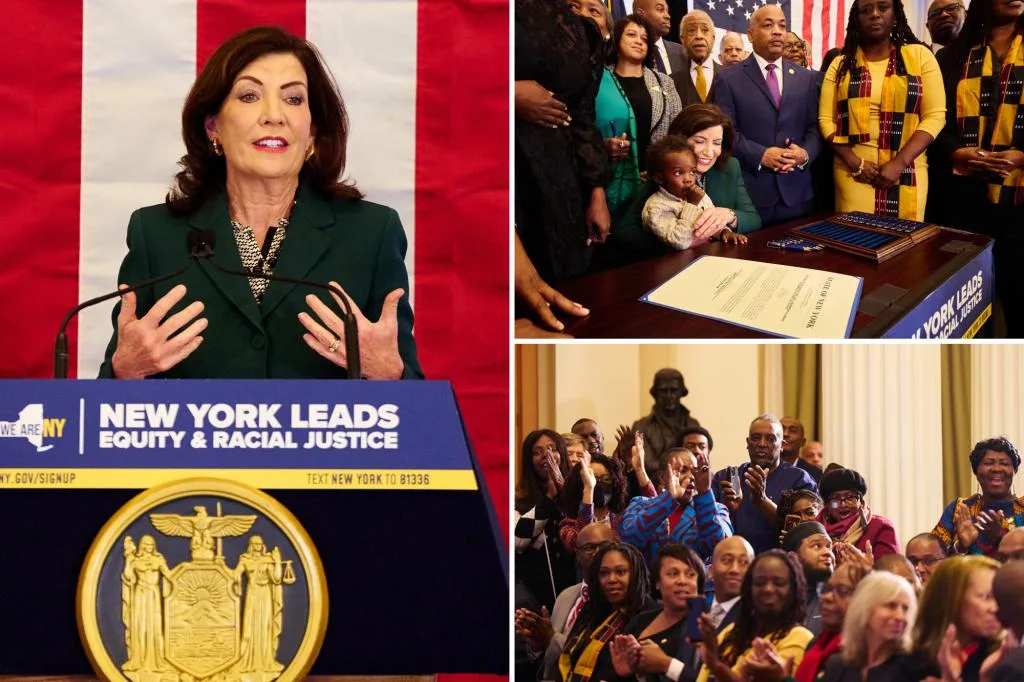
A commission to study the possibility of giving reparations to black New Yorkers was officially created by Gov. Kathy Hochul Tuesday — prompting critics to blast the move as unlikely to lead to anything, after the failures of such efforts elsewhere.
New York’s new commission follows a similar one in California, which hasn’t shown any serious signs of acting on its reparations panel’s eye-popping proposal of a $1.2 million payment to nearly every black citizen as financially impossible.
Some critics suspect the same may happen here.
“A divisive commission to consider reparations is unworkable,” Republican Senate Minority Leader Rob Ortt wrote in a statement. “As we’ve seen in California, I am confident this commission’s recommendations will be unrealistic, will come at an astronomical cost to all New Yorkers, and will only further divide our state.”
Nevertheless, the new legislation signed at a ceremony by Hochul was cheered by civil rights activists.
“I do not know where the commission will go,” Rev. Al Sharpton said at a bill signing ceremony for New York’s commission Tuesday. “But I know that history is made because there is a commission and there is recognition. And sometimes, even if you can’t take away the pain and the scar, we gain a lot by being recognized, that it’s due to be repaired.”
The commission will be charged with recommending appropriate remedies and reparations for black New Yorkers as well as presenting a plan for delivering them, possibly in the form of direct compensation like California.
“If this committee can present a viable path forward, to helping the descendants of New York slaves in addressing the harms and disparities, that exist in education, that exist in housing, that exists in health care, that exist in the environment, that my friends will lift all of us up,” Hochul said.
Hochul said the commission was imperative to righting historical wrongs like New York’s role in the slave trade and segregation.
California’s commission, which was created in 2021, was the first in the nation to look at ways to compensate decedents of slaves for historical inequities over the centuries.
But when it came back with a plan to provide payments of $1.2 million to each black Californian, politicians balked at the massive $800 billion price tag.
California Gov. Gavin Newsom, who once sang the same praises of his state’s commission as Hochul did Tuesday, distanced himself from the payment proposal, which would cost nearly three times as much as the state’s $300 billion budget.
New York would have a similarly hard time affording such a plan, as it has approximately 700,000 more black residents than California and only a $229 billion state budget.
Hochul didn’t much detail as to what she considers viable proposals that could be acted on from the commission’s suggestions.
“I want to make sure there are concrete plans we can operationalize. Is there a policy that can be instituted in state government we haven’t thought of before, for example, to help close the gap between disparate health outcomes for individuals, how we close the wealth gap,” Hochul said. “I’m looking for real policies that will change people’s lives.”
Hochul’s office had little details to offer Tuesday about how the commission’s work would actually be facilitated and funded.
According to the bill, the commission’s nine members must be picked by the governor and Democratic leaders in the state legislature respectively within 90 days.
The members are not paid, but will be reimbursed for expenses according to the legislation.
A Hochul spokesperson said there is no funding being allocated to the panel and that facilitating the process to get a report together is up to the commissioners.
The commission must meet for the first time within six months after its members are nominated.
It then has a year to deliver its recommendations.
The legislation passed through both chambers of the state legislature this year along party lines.


